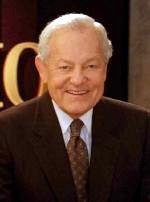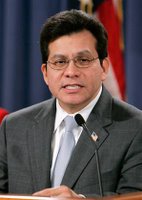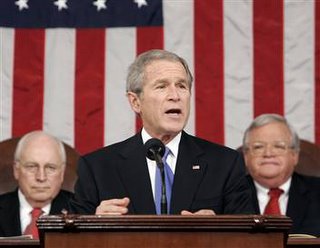# # #
There are signs of hope, or at least signs of change. After ABC anchor Peter Jennings died in August 2005, ABC went through a number of changes trying to come up with the right formula. The network finally hit on the dual-anchor approach. Elizabeth Vargas and Bob Woodruff were tapped to replace Jennings. It was a deliberately bold stroke, one followed by another that happened by accident, when Bob Woodruff and a colleague was seriously wounded by an IED while covering the Iraq war. At this writing Woodruff and ABC cameraman Doug Vogt are said to be mending nicely; ABC’s “World News Tonight” has also been getting well, as the beneficiary of a ghoulish bounce in the ratings after Woodruff and Vogt were injured. And if things weren't challenging enough, there's the news that Vargas is pregnant with her second child, due in August. This all may be a dictionary definition of "interesting times," and certainly a train of events that's got to be keeping ABC's suits awake at night.
 Of equal immediate concern are the prospects for the network’s “Nightline” franchise. After watching the new version of “Nightline” since its launch in November, we're still not sure how we feel about it. It's the ambivalence of seeing someone replacing an older and established colleague -- a person you didn’t like as much as respect – and being unsure how the new crew is going to work out. Sometimes the new format of the show is too cute by half, too earnestly striving to be hip. It’s not just the vertiginous graphics over multiple skylines or the warrior drums at the start and end of the show. If Ted Koppel’s “Nightline” seemed almost willfully a step behind the height of cool, happily trading glitz for gravitas, the new “Nightline” feels like it’s trying too hard in the other direction.
Of equal immediate concern are the prospects for the network’s “Nightline” franchise. After watching the new version of “Nightline” since its launch in November, we're still not sure how we feel about it. It's the ambivalence of seeing someone replacing an older and established colleague -- a person you didn’t like as much as respect – and being unsure how the new crew is going to work out. Sometimes the new format of the show is too cute by half, too earnestly striving to be hip. It’s not just the vertiginous graphics over multiple skylines or the warrior drums at the start and end of the show. If Ted Koppel’s “Nightline” seemed almost willfully a step behind the height of cool, happily trading glitz for gravitas, the new “Nightline” feels like it’s trying too hard in the other direction.The multi-anchor format has its advantages and its problems. On the plus side, the addition of Martin Bashir, in particular, has given the program a global presence it never had before behind the anchor desk. Bashir’s veddy British delivery just barely conceals a razorsharp mind, and a deceptively incisive interview style. And it’s true, getting the show out of the hermetic confines of a studio in Washington has enabled “Nightline” to breathe, to run stories from more than one location – making more kinetic use of those “global resources” ABC trumpets at the start of every segment. But the multi-anchor approach has also undercut the drive for “Nightline” to achieve a singularity of tempo and personality – the things that viewers look for, hope for: a show they’re comfortable with at the end of a day in which they’ve been bombarded by news from everywhere and everyone. The new “Nightline,” perhaps understandably, hasn’t earned its fireplace-and-slippers pedigree yet.
# # #
CBS News is faced with a completely different dilemma, having lately achieved an increase in viewers, and finding itself nearing nothing less than a generational crossroads.
Bob Schieffer, the CBS Evening News anchor and the king of fireplace-and-slippers, has won the hearts of American news viewers, watchers long tired of Dan Rather’s insane Texanisms, and just as tired of the prospect of Rather being the news as much as reporting it. Since Schieffer’s ascension after Rather imploded in early 2005, in the wake of the Bush National Guard story, CBS’ ratings have continued to climb. They’re still in third place, but theirs is the only broadcast of the erstwhile Big Three to gain viewers – about 3 percent.
 The reason may be something as simple as that Golden Rule of Television which Los Angeles Times television writer Matea Gold alluded to in Jan. 16 Calendar piece: If it ain’t broke, don’t mess:
The reason may be something as simple as that Golden Rule of Television which Los Angeles Times television writer Matea Gold alluded to in Jan. 16 Calendar piece: If it ain’t broke, don’t mess:“After a period of experimentation in which network chairman Leslie Moonves and CBS executives contemplated rethinking the entire format of the evening news, the network has quietly decided for now to simply build on the existing newscast, reaffirming a commitment to delivering a traditional, hard-news program.”
Sometimes, however, the future makes up your mind for you when you can’t or won’t do it yourself. This is at the root of CBS’ two-horned dilemma, coming soon, one way or another, to a TV set near you.
One horn of the dilemma is the ultimately doomed resistance to change that arises precisely because things are doing well [see Golden Rule above]. With growing critical acclaim and increasing viewers, CBS News has no reason to change anything – a retrenchment to comfort that’s ultimately doomed by the facts of advancing age. Schieffer will be 69 years old on Feb. 25; as such, his best and brightest days as a journalist are behind him. For a network whose mission and essence are about confronting the present and the future -- and enabling viewers to do the same – the CBS brain trust must have its eyes fixed on a more distant star.
How those recently loyal viewers will react when Schieffer leaves has to be concerning. For all of his deserved emeritus plaudits, it’s no slander to say that Bob Schieffer largely represents the past of CBS News. The veteran Washington correspondent has done an admirable job in a role better than thankless but worse than celebrated: He’s the bridge between eras at a major television news division, he knows it, and he’s enough of a class act not to want to do it forever.
The second horn of the problem is, or may be, one Katharine Anne Couric, the perky X factor whose contract at a rival network expires in May.
 Katie Couric, who’s been deftly playing “perhaps, perhaps, perhaps” on her future at NBC, has long been discussed as the top choice of CBS management to become the permanent anchor at the CBS Evening News. Adding the Couric Variable changes the equation at CBS in several ways. First, it ratchets up the cult of news-anchor personality that was smartly dismantled by Schieffer’s elevation. Second, it reawakens the generational chasm that the CBS Evening News has long been held hostage. And third, Couric’s ascension to the top spot would be a profound snub of any number of qualified in-house candidates with more news experience than Couric has (John Roberts' situation comes most immediately to mind. Weary of the chin-pulling in the executive suite, tired of waiting in the wings to take a bow that might never come, Roberts left the Tiffany network, jumping ship for CNN, it was announced on Feb. 1).
Katie Couric, who’s been deftly playing “perhaps, perhaps, perhaps” on her future at NBC, has long been discussed as the top choice of CBS management to become the permanent anchor at the CBS Evening News. Adding the Couric Variable changes the equation at CBS in several ways. First, it ratchets up the cult of news-anchor personality that was smartly dismantled by Schieffer’s elevation. Second, it reawakens the generational chasm that the CBS Evening News has long been held hostage. And third, Couric’s ascension to the top spot would be a profound snub of any number of qualified in-house candidates with more news experience than Couric has (John Roberts' situation comes most immediately to mind. Weary of the chin-pulling in the executive suite, tired of waiting in the wings to take a bow that might never come, Roberts left the Tiffany network, jumping ship for CNN, it was announced on Feb. 1).In the interest of not fixing what isn’t broken, then, how much more sense it would have made if CBS continued the philosophy that’s made Schieffer such a hit – a safe but inspired choice within the family. Why wouldn't John Roberts have worked as the next in line to carry on the CBS banner? It would have been philosophically consistent with the choice of Schieffer, and a choice that achieves a truce between the old guard of CBS News viewers – a cadre that’s generally getting smaller by the month, recent successes notwithstanding – and a new generation of news hounds who haven’t really developed a favorite in the white noise free-for-all of 21st-century news television.
# # #
NBC and CBS are yoked together by the Couric Variable. What’s shaping up is a true zero-sum game, one of the few played out in traditional American broadcast television in many years. One network will be seen, by advertisers and critics and viewers, to be advancing at the expense of the other.
For NBC the stakes may or may not be all that high. For much of last year, the suits at NBC fretted about how to hold on to Couric, whose presence on the “Today” show has been one of the Peacock’s enduring triumphs in the attractive morning programming period. But more recently there’ve been comments that suggest a willingness to walk away and consider other options. Jeff Zucker, NBC Entertainment president, said that “at some point Katie will decide what the next phase of her life is, and the beauty of the ‘Today’ show is that it’s bigger than the sum of its parts.”
Not exactly answering the bell.
But to some extent, NBC is in the catbird seat. Its evening news leadership has been set for some time. Brian Williams’ ascension to NBC Nightly News anchor in December 2004 has given the Peacock a great head start on solidifying an audience, hard to do in the multichannel world. NBC might be vulnerable in the morning with Couric’s departure. But NBC -- and more properly the extended NBC family that includes a number of cable sources of new talent -- has a much deeper bench, and a lot more choices in-house when considering a high-profile replacement than either CBS or ABC, whose presence in cable is marginal at best. And there’s the money to consider: all of those in-house choices combined wouldn’t command the $25 million a year salary Couric is said to be pulling down.
But the catbird seat isn’t much advantage under water, and that’s an apt metaphor for the steadily sinking ratings of the network Big Three. To their credit, all of them have made more than tentative forays into cyberspace, with weblogs, video on demand and other experiments in informational democracy. CBS has gone so far as to introduce “Assignment America,” a nod to interactive news, in which CBS correspondent Steve Hartman goes to cover one of three stories selected by the viewers. It’s a break with the customary didacticism of journalism (and one that, to judge from Bob Schieffer’s downright nasty on-air dismissal of the experiment, last week, may require convincing those inside CBS as much as the viewers in the world at large).
Maybe that’s the big generational issue to be addressed here: the three mandarins of the medium now, finally, coming to grips with being seen as old and in the way, forced to justify their elder existence in a younger, faster world that may damn well not want them around anymore. How well the Big Three adapt to the rapacious Darwinism at work in television news today could be the biggest story any of them will ever pursue.
-----
Image credits: ABC News, CBS News, Time Magazine












